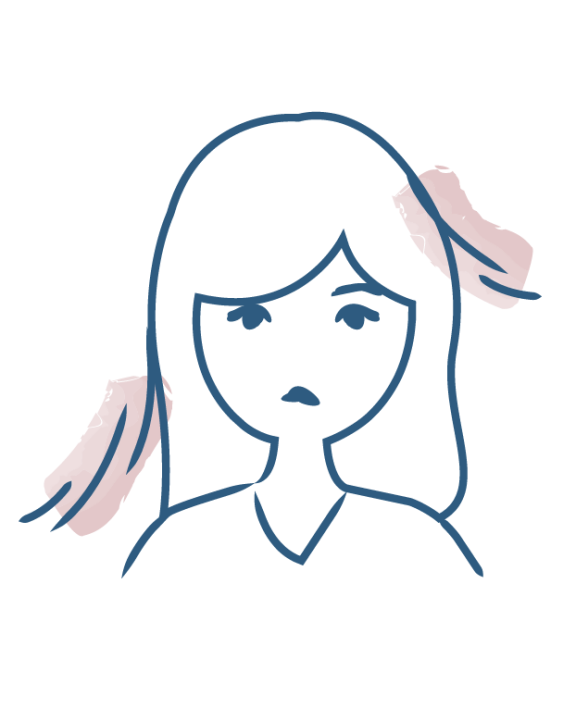What is hair loss?
Occasional or reactional hair loss
- The causes of hair loss
- Drug-induced hair loss
- Hair loss and hormones
- What is traction alopecia?
- Hair loss and genetics
- Hair loss and fatigue
- Hair loss and the pill
- Secondary syphilis and hair loss
- Spot baldness and hair loss
- Hair loss and menopause
- Scarring alopecia
- Hair loss due to stress: reactional hair loss
- Pregnancy and hair loss: everything you need to know
- Hair loss due to ringworm of the scalp
- Hair loss and Covid
- Hair loss: the impact of iron, zinc, vitamin D, C and B12 deficiencies
- Androgenetic alopecia in women and men
- Everything you need to know about seasonal hair loss

Occasional or reactional hair loss
Are you experiencing more intense hair loss than usual? You may be affected by what is known as temporary, occasional or reactional hair loss. So, what is reactional hair loss and how can you deal with it? Let's take a look.
What is reactional hair loss?
The scientific name for reactional or occasional hair loss is "acute telogen effluvium". But what exactly is reactional hair loss? It is the most common form of hair loss in women. It is characterized by the occurrence of increased hair loss in the telogen phase, 2 to 3 months after the occurrence of a triggering event. The most frequent causes of reactional hair loss are hormonal disturbances, particularly after childbirth, stress, fatigue, an unbalanced diet, an infection accompanied by fever... Seasonal changes in the autumn and spring are also factors involved in hair loss: this is known as seasonal hair loss. The hair cycle is then disturbed, resulting in a sudden, diffuse and simultaneous loss of hair in the shedding phase (telogen phase). The proportion of hair in the growth phase (anagen phase) increases to 70% (vs. 85% normally), while that in the shedding phase increases to 30% (vs. less than 10% normally). Reactional hair loss can reach 300 hairs per day compared to 50 to 100 hairs per day for a normal scalp. This hair loss, which lasts less than 6 months, is a frequent reason for dermatology consultations and leads to many questions for healthcare professionals such as pharmacists. Although this condition is considered benign, it can cause real emotional distress in some patients and severely alter their quality of life. When the triggering factor is not identified or eliminated, hair loss can become established over time and become chronic, which is called chronic telogen effluvium.
Occasional alopecia: a fully reversible phenomenon
Unlike chronic hair loss, reactional hair loss is completely reversible. When the triggering factor has been identified and eliminated, the evolution of reactional hair loss is always favorable. It should be noted, however, that it takes about 6 months for hair to grow back, and that it can take up to 12 months, or even 18 months, to return to its original state. An additional cosmetic treatment, based on food supplements and anti-hair loss supplements, can be useful to provide the hair follicles with a sufficient quantity of vitamins and minerals necessary for healthy hair growth. At the same time, treat your hair with care: be careful not to brush your hair too vigorously or use damaging treatments. Avoid tying your hair up to prevent pulling movements that can make it more fragile, and use gentle shampoo and conditioner formulas.
Our targeted solutions for occasional hair loss
Discover our complete range
- Anti-hair loss complement shampoo
ANAPHASE
Anti-hair loss complement shampooRevitalizes - Helps to strengthen - Prevents hair loss
More information
- Discover Hair loss in women
What is hair loss?
Hair loss in women
- Discover Chronic hair loss
What is hair loss?
Chronic hair loss
- Discover Hair loss in men
What is hair loss?
Hair loss in men
- Discover Diffuse hair loss
What is hair loss?
Diffuse hair loss
- Discover The hair's life cycle
What is hair loss?
The hair's life cycle
- Discover ANTI-OCCASIONAL HAIR LOSS ROUTINE FOR MEN LESS THAN 6 MONTHS
ANTI-OCCASIONAL HAIR LOSS ROUTINE FOR MEN LESS THAN 6 MONTHS
Are you experiencing hair loss?
- Discover Anti-occasional Hair loss routine for women less than 6 months
Anti-occasional Hair loss routine for women less than 6 months
Are you experiencing hair loss?
- Discover My Anti-hair loss for women post-pregnancy and breastfeeding women
My Anti-hair loss for women post-pregnancy and breastfeeding women
Are you experiencing hair loss?




